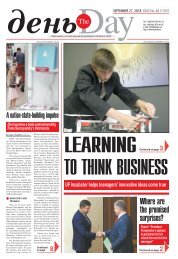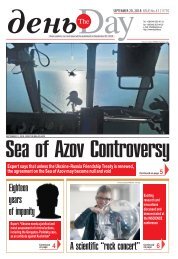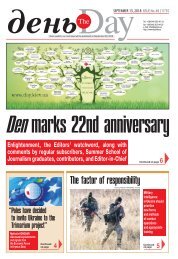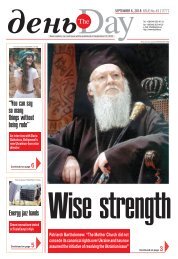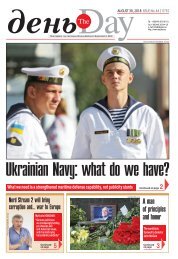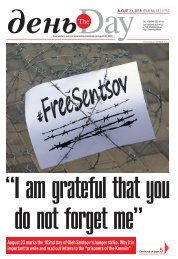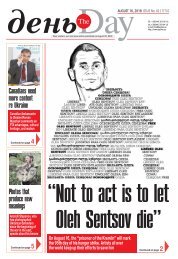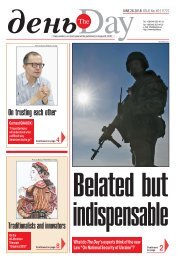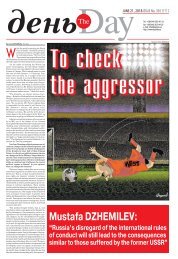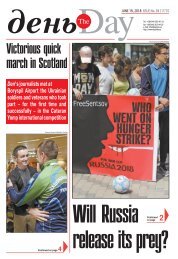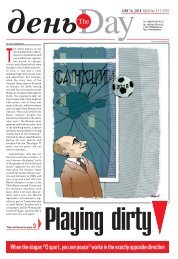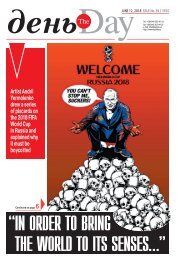#1_1-8
Create successful ePaper yourself
Turn your PDF publications into a flip-book with our unique Google optimized e-Paper software.
WWW.DAY.KIEV.UA<br />
CLOSE UP No.1 JANUARY 16, 2018 7<br />
hope historians are aware of why<br />
students need to know history in<br />
general and the history of philosophy<br />
in particular. Whenever people<br />
gain independence, they always<br />
find new opportunities.<br />
“I am an optimist by nature –<br />
like Leibniz, I am sure that we are<br />
living in ‘the best of all possible<br />
worlds.’ At the unification ceremony,<br />
our rector, Ihor Koval, quoted<br />
Winston Churchill quite to the<br />
point: ‘an optimist sees the opportunity<br />
in every difficulty.’ It is in<br />
this key that one should interpret<br />
critical remarks in our conversation.<br />
“Undoubtedly, the current<br />
leadership has done what all the<br />
previous ones failed to do. There is<br />
certain progress, and it would be<br />
wrong to slow it down – I believe<br />
we will never return to the Russian<br />
Empire. In spite of all the<br />
alarms, I don’t think Russia will<br />
try to continue its advance and<br />
seize Ukraine. If people knit together<br />
on the basis of the rejection<br />
of and hatred for others, they are<br />
sick people in a sick society. Unfortunately,<br />
today’s Russia is predominantly<br />
a sick society. Ukraine<br />
must not become a similar one. As<br />
a separate nation and state,<br />
Ukraine needs its own values –<br />
more exalted than those of imperial<br />
awareness.”<br />
■ The Day’s REFERENCE<br />
Serhii SEKUNDANT graduated<br />
from the Philosophy Faculty<br />
and the Candidate and Doctor of<br />
Sciences School of Moscow Mikhail<br />
Lomonosov State University. He<br />
began to work at Odesa Illia Mechnikov<br />
State University in 1982.<br />
Successfully defended the Candidate<br />
of Sciences dissertation “The<br />
Problem of Proving Scholarly<br />
Knowledge in the Methodical Philosophy<br />
of Hugo Dingler” in 1983<br />
and the Doctor of Sciences dissertation<br />
“The Normative and Critical<br />
Foundations of Leibniz’s Epistemology”<br />
in 2015. Teaches the<br />
courses “Philosophy of the East,”<br />
“German Classical Philosophy,”<br />
“The Problems of Indian Philosophy,”<br />
“The Philosophical and<br />
Methodological Problems of Historical<br />
and Philosophical Research,”<br />
“Phenomenology of<br />
Husserl,” “Contemporary Concepts<br />
of the History of Philosophy,”<br />
and “The Theory and Practice<br />
of Argumentation.” The<br />
sphere of academic interests: the<br />
history of philosophical methodology,<br />
logic and epistemology; the<br />
theory of argumentation; philosophical<br />
and methodological problems<br />
of the history of philosophy;<br />
researching the nature of philosophical<br />
and religious knowledge;<br />
the making and the specifics of ancient<br />
Indian philosophy and religion;<br />
a comparative analysis of the<br />
philosophical and religious tradition<br />
in the East and the West.<br />
Author of over 100 scholarly publications.<br />
Author of two individual<br />
monographs: Critique and Method.<br />
The Problem of a Critical Method<br />
in 17th-18th-Century German Philosophy<br />
(Kyiv, Dukh i Litera,<br />
2012) and Leibniz’s Epistemology<br />
in its Normative and Critical Foundations<br />
(Odesa, Pechatny Dom,<br />
2013). Member of the Philosophy<br />
Faculty’s Academic Board, co-organizer<br />
of the international school<br />
of religious studies “Vaishnavism<br />
Across the Centuries,” director of<br />
the German Philosophy Research<br />
Center at the Philosophy Faculty<br />
of Odesa National Illia Mechnikov<br />
University. Winner of the National<br />
Philosophy Prize 2016 (established<br />
by the Hryhorii Skovoroda<br />
Institute of Philosophy, the<br />
Ukrainian Philosophical Foundation,<br />
and the N.V. Panina Sociological<br />
Center) in the Maria Zlotina<br />
nomination “For Best Philosophical<br />
Monograph.”<br />
(To be continued)<br />
By Valentyn TORBA, The Day<br />
This Tuesday, the Verkhovna Rada is<br />
to consider the bill No. 7163,<br />
dealing with the restoration of<br />
Ukraine’s sovereignty. This document<br />
is sometimes referred to as<br />
the “reintegration” bill, although its very<br />
title clearly points to the fact of occupation.<br />
This draft law has seen many changes<br />
over the long time it has been in preparation.<br />
However, are the Ukrainian<br />
government and public really aware of all<br />
the subtle and painful nuances associated<br />
with the very process of restoring the<br />
territorial integrity of our nation?<br />
Let us recall that the Verkhovna Rada<br />
passed the bill, initiated by President of<br />
Ukraine Petro Poroshenko, in the first<br />
reading on October 6, 2017. This document,<br />
in particular, regulates the legal basis<br />
for the use of the Ukrainian Armed<br />
Forces in the east of the country and officially<br />
labels the Russian Federation as<br />
the aggressor.<br />
In turn, the Verkhovna Rada Committee<br />
on National Security and Defense inserted<br />
238 amendments into the bill back<br />
on November 15, 2017. Importantly, the<br />
MPs stressed the need to emphasize not only<br />
the issue of the occupied Donbas, but that<br />
of Crimea as well. Thus, the committee decided<br />
to insert into the document the mention<br />
of Russian-annexed Crimea and to add<br />
to the preamble a reference to the date of<br />
occupation, which is considered to start on<br />
February 20, 2014. Also, a mention of the<br />
Minsk Agreements has been erased from<br />
the bill, since, according to experts, it<br />
could have come to be treated as a legal<br />
recognition of their legitimacy.<br />
On January 10, President Poroshenko<br />
met with representatives of Ukraine in the<br />
Trilateral Contact Group on the Peaceful<br />
Settlement of the Donbas Crisis. It is indicative<br />
that such a meeting took place just<br />
before the vote on the draft law on de-occupation.<br />
Leonid Kuchma, Iryna Herashchenko,<br />
Yevhen Marchuk, Volodymyr<br />
Horbulin, and other figures took part in the<br />
event.<br />
Herashchenko stresses that for the humanitarian<br />
group, the second wave of<br />
hostage release is a key priority for the near<br />
future. Let us recall that former Prime<br />
Minister of Ukraine, Head of the SBU,<br />
Minister of Defense and Secretary of the<br />
National Security and Defense Council<br />
Yevhen MARCHUK, currently serving<br />
as a representative of Ukraine in the Tripartite<br />
Contact Group in Minsk, noted at<br />
the International Conference on Maritime<br />
Security last December that Ukraine and<br />
the rest of the world needed to seize every<br />
opportunity for maintaining dialog with<br />
the Russian Federation. Marchuk then<br />
compared a totally isolated Russia to a<br />
black hole. Such a state of affairs, in his<br />
opinion, may have much too negative consequences.<br />
● “WE HAVE NO PRESCRIBED<br />
MECHANISM FOR THE<br />
RETURN OF OUR LAND”<br />
“I can clearly say that the draft law on<br />
de-occupation must be adopted, no ifs or<br />
buts about it,” The Day heard from member<br />
of the coordination council of The<br />
Power of Law NGO, former head of the<br />
Luhansk Oblast State Administration Iryna<br />
VERYHINA. “We need it, if only to finally<br />
call the war a war. From this term,<br />
everything else is derived, including in the<br />
legal field. I emphasize, we are not conducting<br />
some anti-terrorist operation<br />
(ATO), but waging a real war. And we also<br />
have to determine in the legal field<br />
that a part of our territory is occupied. I<br />
emphasize that it is occupation of Ukrainian<br />
territory by the Russian Federation,<br />
which should carry the corresponding legal<br />
consequences. The only thing that<br />
worries me is that we have no prescribed<br />
mechanism for the return of our land. That<br />
is why we in the Power of Law NGO have<br />
created an appropriate public platform<br />
for de-occupation and reintegration of<br />
our territories. Together with the public,<br />
we have to find the appropriate ways of<br />
restoring our sovereignty. As we have<br />
seen, the public is often more active than<br />
state institutions. Perhaps the process of<br />
returning the territories will not happen as<br />
quickly as we would like. But this will surely<br />
happen. And here it is important not to<br />
We need clear guidelines<br />
The Verkhovna Rada is to consider a bill on the<br />
restoration of sovereignty of Ukraine on January 16<br />
forget that the occupiers must compensate<br />
for damages suffered by Ukrainians. After<br />
all, it is Russia that is to blame for material<br />
and moral losses suffered by millions<br />
of Ukrainians. And that is why Russia<br />
should compensate them in full. I would<br />
like to emphasize that Crimea and the<br />
Donbas cannot be treated separately. The<br />
sovereignty of our state is held sacred by<br />
Ukrainians. It affects not only certain<br />
territories, but also the integrity of the<br />
state as a whole. Therefore, this bill should<br />
have been passed a long time ago. Unfortunately,<br />
there are certain political speculations<br />
around it. It should have been enacted<br />
as early as last year, but we see that<br />
political horse-trading is continuing.<br />
Everything depends on the will of the<br />
president. If he makes a decision, then the<br />
bill will be passed into law. It turns out that<br />
we can trade with the occupier nation, but<br />
cannot call the war a war. And it is internally<br />
displaced persons (IDPs), once again,<br />
who become hostages of such a policy. I<br />
would like to emphasize separately that I<br />
want to see IDPs getting back their voting<br />
rights at the legislative level. This is a big<br />
problem, because we have a lot of Ukrainian<br />
citizens who are effectively barred from influencing<br />
the nation’s politics.”<br />
● “THE GOVERNMENT IS JUST<br />
FAKING ATTEMPTS TO<br />
RESTORE THE TERRITORIAL<br />
INTEGRITY OF OUR STATE”<br />
In his turn, Candidate of Law, senior<br />
research fellow of the Koretsky Institute<br />
of State and Law of the National<br />
Academy of Sciences of Ukraine Mykola<br />
SIRYI emphasized in his comments for<br />
The Day the basic conceptual tasks associated<br />
with the restoration of state sovereignty:<br />
“Even if we are talking about a<br />
purely legal aspect of the issue, we still<br />
have to proceed from the objective of<br />
restoring the territorial integrity of this<br />
country,” Siryi said. “This is the basic<br />
question from which all other means of its<br />
implementation should derive. So far, I do<br />
not see an answer to this question being offered.<br />
We often talk about the international<br />
community now, which seems to be<br />
the guarantor of this objective being<br />
reached. Of course, this is an important<br />
tool, but it cannot be, so to speak, the principal<br />
one. The real basis is our desire to restore<br />
sovereignty. Therefore, any talk of<br />
reintegration without a clear strategy<br />
for the restoration of sovereignty is somewhat<br />
meaningless. The only goal that<br />
this bill can achieve is the recognition of<br />
the fact of occupation of our territory. The<br />
Ukrainian state should establish the nature<br />
of relations with Ukrainians who<br />
have found themselves in the occupied territory,<br />
which would bring us closer to<br />
restoring the territorial integrity of our<br />
state. This is the crux of the matter, and<br />
it is in this context that legislative and executive<br />
decisions should be made. So far,<br />
it seems that the government is just faking<br />
attempts to restore the territorial<br />
integrity of our state. They are making<br />
waves in the media space, but it does<br />
nothing to restore the abovementioned integrity.<br />
We must clearly understand that<br />
we have now two levels of relations – with<br />
the aggressor and with the people who live<br />
under occupation. This requires a clear<br />
strategy at the national level and principles<br />
that need to be unfailingly respected.<br />
The aggressor will abandon our territories<br />
when it really feels our strength. And we<br />
must demonstrate our ability to protect<br />
ourselves in every possible way. Ukrainians<br />
who find themselves in the occupied<br />
territory, in turn, should feel that the<br />
greater Ukraine has not forgotten about<br />
them. Their connections with the greater<br />
Ukraine should not weaken, but, on the<br />
contrary, grow stronger. For example, the<br />
question arises: where will children who<br />
remain in the occupied territory go to<br />
study? We must also give a thought to the<br />
situation where people are forced to go to<br />
the occupied territory because of family<br />
circumstances. In which hospitals should<br />
they be treated, Ukrainian or Russian<br />
ones? All these questions should be answered<br />
by the Ukrainian state. And the<br />
context for these answers, I emphasize,<br />
should be making Russia to perceive<br />
Ukraine as a serious military adversary.”<br />
● “WHILE PERFECTING<br />
THE DRAFT LAW ‘ON<br />
DE-OCCUPATION,’<br />
NOBODY HAS CROSSED<br />
THE RED LINE”<br />
International lawyer Volodymyr VA-<br />
SYLENKO, who has been directly involved<br />
with drafting the bill “On the Peculiarities<br />
of State Policy on the Restoration of the<br />
State Sovereignty of Ukraine over the<br />
Temporarily Occupied Territory of the<br />
Donetsk and Luhansk Regions of Ukraine,”<br />
has noted that, despite attempts to radically<br />
remake the bill, it has not undergone<br />
any major changes.<br />
THE DAY AFTER ANOTHER SHELLING. AVDIIVKA, FEBRUARY 2, 2017<br />
“Talking about the draft law on de-occupation,<br />
which has been published on the<br />
website of the Verkhovna Rada, I should<br />
say that it is acceptable in principle,” Vasylenko<br />
commented for The Day. “However,<br />
it needs some cosmetic clarifications<br />
that should improve the legal technique<br />
on the issue. The fact that this bill has<br />
been met with unconstructive noise means<br />
that Russian agents in Ukraine are working<br />
at full capacity. For them, the adoption<br />
of this bill is a thorn in their side, because<br />
it is this bill that, if adopted, will<br />
effectively protect the interests of<br />
Ukraine. After all, this bill clearly defines<br />
the real state of affairs, namely the reality<br />
of the war and the occupation of<br />
Ukrainian territories. Prior to this, there<br />
was a fog of definitions in which it was<br />
unknown who fought whom, and the<br />
Russian Federation in general seemed to<br />
have nothing to do with it. Worse still, the<br />
Russian Federation is artificially positioning<br />
itself as a peacekeeper who only<br />
seeks to help Ukraine. This is wrong, and<br />
we have to make it clear on all levels, including<br />
in the legal dimension. As for the<br />
draft law itself, in fact, there have been<br />
many amendments proposed to it. Those<br />
passing the common sense test have been<br />
inserted into it. A lot of compromise<br />
proposals have made it to the text as well.<br />
There is nothing strange about this, and<br />
this work does not contradict the essence<br />
of the law. I hope that the draft law will<br />
be adopted on January 16. It should be<br />
noted separately that the just-mentioned<br />
bill makes no mention of the Minsk Agreements.<br />
But this does not mean that<br />
Ukraine refuses to comply with its obligations.<br />
At the same time, we must understand<br />
that the security issue must be<br />
resolved first and foremost in the framework<br />
of the Minsk Agreements. The second<br />
point is that all political issues should<br />
be dealt with on the basis of universally<br />
accepted principles of international law.<br />
In the process of drafting the bill, I have<br />
really had to persuade some politicians of<br />
the need for appropriate wording. I have<br />
also had to make certain compromises, but<br />
nobody has crossed the ‘red line.’”<br />
Thus, this week, the Verkhovna Rada<br />
will have an opportunity to put an end to<br />
the abstract definitions that have plagued<br />
Ukraine since 2014. The ATO will then be<br />
officially called a war, and the de facto occupation<br />
will be de jure recognized as<br />
such. This, in turn, should also affect the<br />
legal aspect of the matter, since the wording<br />
and definitions used determine the consequences<br />
in terms of bringing claims of<br />
damage against the aggressor. As practice<br />
shows, NGOs take initiative and come<br />
ahead of government representatives in<br />
this field.<br />
Photo by Yevhen MALOLIETKA<br />
XIX INTERNATIONAL COMPETITION<br />
PHOTO — - 2017



